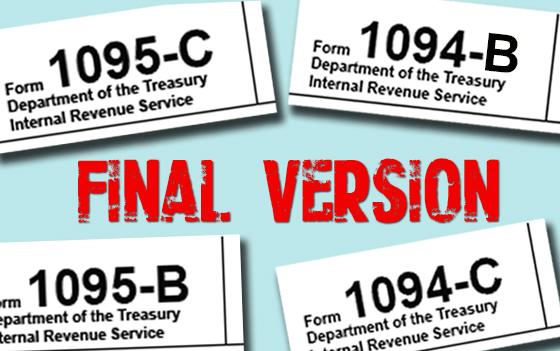Affordable Care Act Reporting Update (Benefit Minute)
Posted in: Employee Benefits

The IRS has issued final versions of Forms 1094-B, 1094-C, 1095-B and 1095-C for use by insurers, employers and other entities to report enrollment in minimum essential coverage and the offer of minimum essential coverage. This Benefit Minute provides an overview of the reporting requirements and provides detail on changes to the forms for the 2016 reporting year.
Forms 1094-B and 1095-B
These forms are prepared and furnished by insurance carriers to report enrollment in fully-insured coverage and by small employers (less than 50 full-time equivalent employees) to report enrollment in self-insured coverage. These forms may also be used by large employers to report individuals who were not employees at any time during the calendar year, but were enrolled in self-insured coverage. Alternatively, these non-employees may be reported on a Form 1095-C as discussed below. The Form 1095-B is provided to each subscriber who was covered for at least one day during the calendar year. Covered dependents are listed on the form. The Form 1094-B and the Form 1095-B data are provided to the IRS (generally electronically) by the insurance carrier or employer.
Forms 1094-C and 1095-C
These forms are prepared and furnished by large employers (50 or more full-time equivalent employees) who are subject to the ACA employer mandate. The Form 1095-C must be provided to each employee who met the ACA definition of full-time during 2016. Using certain indicator codes, it reports whether minimum essential coverage was offered, the cost of the coverage, and any applicable safe harbor codes (to minimize employer mandate penalty exposure). For large employers with self-insured plans, it also reports enrollment (including dependents) by month. The Form 1095-C can also be used to report enrollment in self-insured plans by non-employees. The Form 1094-C and the Form 1095-C data are provided to the IRS by the employer. Electronic filing is required if 250 or more forms are issued. Each employer within a control group must file its own Forms 1094-C and 1095-C under its own separate federal employer identification number (EIN).
Filing Deadlines
On November 18, 2016, the IRS extended the deadline to provide Form 1095-B and Form 1095-C from January 31, 2017 to March 2, 2017. Instead of approving the individual extension requests, the IRS is granting a blanket extension to give employers additional time to distribute the Forms 1095-C. Any employer who has already requested an extension will not receive a response from the IRS. No further extensions to furnish the forms to individuals will be granted. Employers are still encouraged to distribute the forms as soon as they are able. There is no extension of the due dates to file with the IRS. The due date is March 31, 2017 for electronic filing (or March 2, 2017 if filed on paper).
Changes for 2016 Reporting
The basic formats for the 2016 reporting forms are unchanged. However, there are several changes in how certain information should be reported on the Form 1095-C and Form 1094-C. These changes include:
- Conditional offer of coverage to a spouse – new line 14 codes 1J and 1K have been added for a conditional offer of coverage to a spouse. A conditional offer is one that is subject to one or more reasonable objective conditions, whether or not the spouse satisfies the condition.
- Terminated employees – the instructions clarify that there is no requirement to report an offer of coverage to a terminated employee, including offers of COBRA or retiree coverage.
- Offer of COBRA due to reduction in hours – when the COBRA qualifying event is reduction in hours, the offer of COBRA must be reported on line 14 of the Form 1095-C. The offer of coverage code should reflect the coverage level in which employee was enrolled at the time of the reduction in hours. For example, if the employee was enrolled in employee-only coverage, the line 14 code for the COBRA offer will be code 1B (employee-only offer). An employer will still be considered to have made an offer of coverage to dependents for the entire calendar year even though the employee waived coverage for the dependents and as a result COBRA was not offered to them.
- Clarification of line 14 code 1A – code 1A is used to report a qualifying offer (an offer of coverage to employee, spouse, and dependent children at a monthly cost that meets the FPL safe harbor). The instructions clarify that use of code 1A is optional and that completion of a line 16 safe harbor code is not required when 1A is used.
- Clarification of line 14 code 1G – the instructions clarify that code 1G applies to the entire calendar year and is only used if the individual was not a full-time employee for any month of the calendar year but was enrolled in a self-insured plan.
- Full time employee count on Form 1094-C – the column heading has been changed to “Section 4980H Full-Time Employee Count for ALE Member” since the ACA definition of full-time employee must be used for reporting this number.
Penalties
On November 18th, the IRS also extended the good faith transition relief to apply for 2016 filings. This provides penalty relief to employers who can show they made good faith efforts to comply with the information reporting requirements. The relief applies only to incorrect or incomplete information reported on a Form 1095-C (assuming a good faith effort was made to get it correct) and not to a failure to timely provide a Form 1095-C or Form 1095-B. It requires employers to make a reasonable effort to gather data, prepare the required information and provide it to employees.


